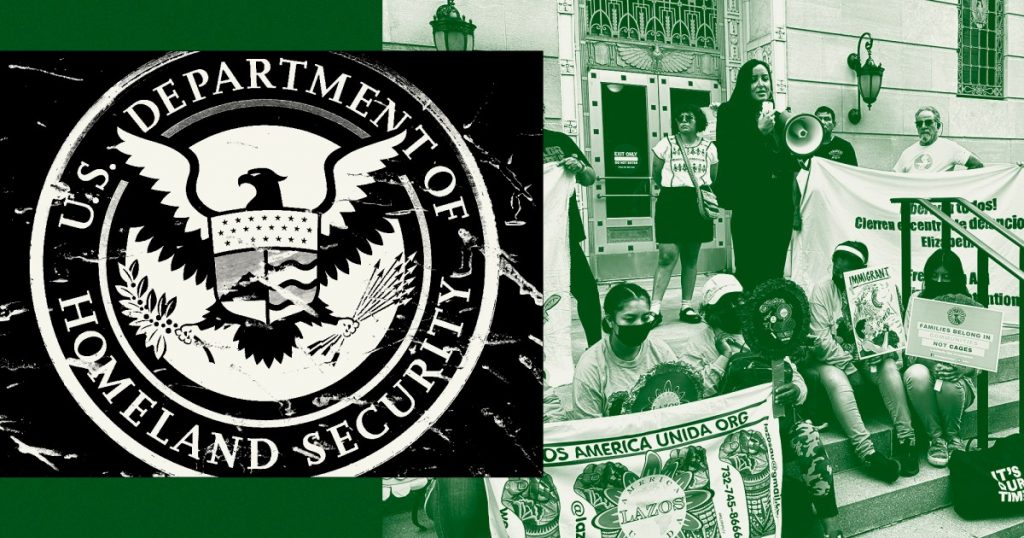A Judge Just Halted Efforts to End Immigration Detention in New Jersey
Mother Jones; Aaron M. Sprecher/AP; Detention Watch Network
Fight disinformation: Sign up for the free Mother Jones Daily newsletter and follow the news that matters.Yanet Candelario could feel her body grow tense as she remembered some of her experiences during the 13 months she spent at the Elizabeth Detention Center in New Jersey. A dual citizen of Canada and Cuba, holding a placard that asked, “Why is Biden Siding With a Private Prison Co.?” she had joined dozens of other advocates outside the Clarkson S. Fisher Federal Building and United States Courthouse in Trenton, New Jersey, to demand the closure of the state’s oldest and last remaining immigrant prison. “I remembered the toxicity and the pain I saw in that place,” Candelario says. She had been sent to the detention center after returning from a trip to Panama in 2016, while her application for lawful permanent status was pending. “It’s a place of destruction, really,” she adds.
Today the facility houses an average of about 160 migrants a day—both men and women—and is run by CoreCivic on a contract with US Immigrations and Customs Enforcement (ICE) that was set to expire on August 31. The future of the detention center has been under litigation for several months. On August 14, US District Court Judge Robert Kirsch heard arguments in a case about a 2021 state law signed by Gov. Phil Murphy that barred public and private entities from entering, renewing, or extending contracts with ICE to detain immigrants.
On Tuesday, Judge Kirsch issued a ruling siding with CoreCivic. “The result of any one of New Jersey’s neighboring states passing a comparable law—let alone an ensuing domino effect to other states—would result in nothing short of chaos,” he wrote, adding that “the statute is a dagger aimed at the heart of the federal government’s immigration enforcement mission and operations.” The ruling paves the way for ICE and CoreCivic to renew their contract and for immigrants to continue being detained in the Elizabeth Detention Facility.
We are disappointed with today’s ruling, which we view as interfering with NJ’s right to protect its residents. Private detention facilities threaten the public health and safety of New Jerseyans, including when used for immigration purposes. We will be appealing this decision.
— Attorney General Matt Platkin (@NewJerseyOAG) August 29, 2023
CoreCivic, which is one of the largest prison operators in the United States and runs dozens of facilities across the country, had sued to stop the state from enforcing the law, arguing it undermined the federal government’s authority and violated the supremacy clause of the Constitution, which establishes that federal laws take precedence over state laws. The company took the position that an “increasing activist resistance to the use of public-private partnerships for correctional, detention, and residential reentry facilities” could “have a material adverse effect on our business, financial condition, and results of operations.” In the fiscal year 2021, the company’s dealings with ICE brought in $552 million, or 30 percent of its overall revenue. Formerly known as Corrections Corporation of America (CCA), it claims the closure of Elizabeth Detention Center would have meant a loss of $18 million per year over the next four years. Now, following this ruling, their position is secure.
“Unanimously, from grassroots, from people on the inside, even from the landlord, New Jersey is opposed at every level of society to this ICE contract,” Amy Torres, executive director of the New Jersey Alliance for Immigrant Justice, said before the ruling. “And yet, CoreCivic is trying to make the case that they should be allowed to continue their agreement despite the massive amount of money that they already make from private detention and private prison.”
When Gov. Murphy signed AB 5207 into law in August 2021, it was heralded as a significant win for the immigrant rights movement—in New Jersey and beyond. Before the pandemic, the four immigration detention facilities in the state held as many as 2,000 immigrants from various countries on any given day. After the bill became law, three county jails—Essex, Hudson, and Bergen—stopped detaining immigrants for ICE. Elizabeth Detention Center, meanwhile, remained open because during the time that had lapsed between the passage of the legislation and the governor’s signature, ICE and CoreCivic had quietly renewed their contract for the facility for another two years.
When he took office, President Joe Biden signed an executive order to end the use of private prisons; but it didn’t cover immigration detention. Under his administration, the percentage of immigrants detained in facilities owned or operated by private companies has risen to 90 percent of all detainees as of July—in comparison to 81 percent in January 2020—according to the American Civil Liberties Union. Last month, the Biden administration filed a statement of interest supporting CoreCivic’s efforts to stop the enforcement of New Jersey’s detention ban.
The government described the privately-run Elizabeth Detention Center as a “mission critical” facility because of its proximity to the Newark International Airport, the location from which many deportation flights depart. Its closure, they argued, “would seriously impair immigration operations in the region and cause irreparable harm to the United States.” The federal government, which hoped to extend the contract for another 12 months, also expressed concern that if other states passed similar laws it would result in “a near-catastrophic impact” on ICE’s mission. The facility has the capacity to hold 300 people, some of whom are transferred from out-of-state, but are mostly those who have been arrested at ports of entry in Newark and New York.
The New Jersey effort was part of a burgeoning national movement that attempts to chip away at the prison-to-deportation pipeline—one detention center at a time. The movement, primarily led by current and formerly detained immigrants, has come a long way from the social media-fueled “Abolish ICE” calls of 2018, effectively working with legislators to pass anti-detention laws and making a case for a system that doesn’t use incarceration as the default option to house immigrants.
Illinois, for example, passed a ban on private immigration detention in 2019, and two years later, another law known as the Way Forward Act, prohibiting local jurisdictions from contracting with ICE, effectively ended all ICE detention in the state. California and Washington state have also passed for-profit detention bans, which have been challenged in court. Last year the Ninth Circuit Court of Appeals ruled California’s AB 32 to be unconstitutional because it “would override the federal government’s decision, pursuant to discretion conferred by Congress, to use private contractors to run its immigration detention facilities.” The ruling by Judge Kirsch is consistent with this.
Nonetheless, advocates consider that “anytime a detention center is stopped or shut down, it’s progress,” notes Silky Shah, executive director of the Detention Watch Network, a national coalition working to abolish immigration detention. “It might be that a place is shut down, and more beds open up somewhere else. That’s unfortunate and we’ve seen that already with this administration. But having it be shut down shows our power and shows what we’re capable of.”
New Jersey is among the five states with the largest number of immigrants, who make up 23 percent of the state’s population. Immigrant communities in the Garden State have fought for protections for temporary and warehouse workers and stood up to the Trump administration’s challenges to sanctuary policies. The state, Torres notes, “has always set a high bar for what it looks like to defend and protect immigrant communities…This isn’t our first time taking on a big opponent and I don’t think it’s the last front of the fight to end detention.”
During the August demonstration, dozens of advocates packed the courtroom and protested on the steps of the courthouse. They brandished signs that read “Abolish ICE Detention” and “It’s Not Over Until Everyone Is Free.” Among the protesters were former detainees like Edwin Koi, who came to the United States from Sierra Leone and was granted asylum in 2019. He’s now a member of the board of directors of the immigrant advocacy group, First Friends of New Jersey and New York. “They’re trading your future for money,” Koi said. “Shackling and caging kill people slowly. No one is free until all are free.”
The Elizabeth Detention Center, a windowless former industrial warehouse, has been the site of protests since its inception. In 1995, just months after the government started detaining immigrants at the facility, then operated by Esmor Correctional Services of Melville, an uprising broke out when detainees objected to substandard conditions and abuse by guards.
An investigation by the Immigration and Naturalization Service, the federal immigration agency at the time, found evidence of physical and verbal abuse and harassment by guards. Immigration agents told the New York Times at the time that the detention center was a “disaster waiting to happen.” ICE first started contracting with CoreCivic for the Elizabeth Detention Center in 2005 and the agreement has been renewed several times since. In that period, two detainees have died while in the Elizabeth Detention Center. Boubacar Bah, a 52-year-old from Guinea, passed away in 2007 as a result of a head injury caused by a fall and being left unattended for hours. In 2011, medical neglect also contributed to Victor Ramirez-Reyes’ death from heart disease.
This detention center and other facilities came under increased scrutiny during the Covid-19 pandemic. At one point, the state had the most number of confirmed cases in the entire country, with Elizabeth leading among the detention centers in the state. Calls to release detainees grew louder and four of them joined a class-action lawsuit denouncing the prison’s unsanitary conditions. In July 2020, the Elberon Development Group, which owns the building that houses the detention center decided to cut ties with CoreCivic and sued the private prison corporation alleging it failed to follow the Centers for Disease Control and Prevention (CDC) protocols to prevent the spread of the coronavirus.
But during the August hearing, Judge Kirsch appeared to be unmoved by the Elizabeth Detention Center’s bad track record. “I have a feeling if we went to the Passaic County Jail, the Union County Jail, over the last 17 years, significantly more than two people, unfortunately, would have lost their lives,” he said, according to the New Jersey Monitor. “There’s probably two school teachers over the last 17 years in the state that, while on school premises, passed away. Do we shut down the schools because of it?” The judge also seemed to side with the government’s concerns about a potential ripple effect onto other states passing similar anti-detention laws, saying: “What would happen if I embrace your view and that becomes a contagion across this land?”
A few days after the hearing, advocates held another rally outside the Elizabeth Detention Center. The day marked the second anniversary of the anti-detention bill. As planes flew above, they shouted “shame” and “free them all” chants. Ten members of Congress from New Jersey wrote to the Department of Justice: “CoreCivic’s quest to continue operating EDC in violation of AB 5207 undermines our state’s democratic process and is counter to the wishes of the community in Elizabeth, local congressional districts, and the state.”
But, for now, the state of New Jersey’s detention of immigrants will remain unchanged.
🚨 BREAKING NEWS: Judge Kirsch has sided with CoreCivic to keep Elizabeth Detention Center OPEN.
This news is infuriating BUT THE FIGHT IS NOT OVER!✊🏽 Whether in the streets or in the court room, we will not give up until immigrant detention is out of New Jersey! pic.twitter.com/YCjYNfjKEk
— NJ Immigrant Justice (@NJAIJ) August 29, 2023





